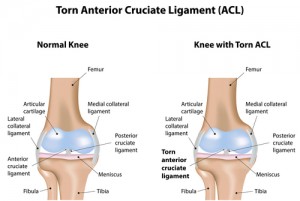What Happens When You Tear Your ACL?
Your anterior cruciate ligament, commonly known as the ACL, is one of the most important ligaments in your knee. Ligaments are vital components of movement because they stabilize joints. A problem in the ACL affects your ability to properly move and rotate the knee. Since it is also under the most stress, the ACL is one of the most commonly injured ligaments; over 200,000 people in the U.S. experience an ACL injury every year.
What Causes an ACL Tear?
 ACL tears are often seen in athletes, but they can occur for a number of reasons. Most ACL tears occur during sports, fitness activities, and other instances when stress is placed on the knee. Most people tear their ACL doing one of the following:
ACL tears are often seen in athletes, but they can occur for a number of reasons. Most ACL tears occur during sports, fitness activities, and other instances when stress is placed on the knee. Most people tear their ACL doing one of the following:
- Abruptly slowing and changing directions
- Pivoting with the foot firmly planted
- Landing from a jump incorrectly
- Stopping suddenly
- Collision or blow to the knee
What Is an ACL Tear?
A tear in the ACL is exactly what it sounds like. The sudden shifting of the ligament causes a tear in the fibrous tissues. An untreated ACL tear can lead to serious long-term effects and damage to other functions of knee. This creates problems in the future.
Symptoms of an ACL Tear
- A “popping” sensation in the knee
- Severe pain around the knee
- Swelling
- Loss of motion
- Inability to bear weight on the affected leg
Treating an ACL Tear
If you believe you have torn your ACL, it is important to see a doctor immediately for diagnosis. A physical test is performed to check the integrity of the ACL, and an MRI may be performed to confirm the diagnosis of an ACL tear. After diagnosis, an ACL tear is treated as soon as possible to minimize the possible long-term effects.
Non-Surgical Treatments
Your orthopedic surgeon will determine if surgery is the best option at the time. However, whether or not you are undergoing surgery, non-surgical treatments help ease pain and increase the strength of your knee.
- Attempt to decrease swelling using the RICE technique (rest, ice, compression, elevation)
- Perform small exercises to regain full range of motion of the knee joint
- Increase the strength of the muscles surrounding the knee
Surgery
Patients with a torn ACL who are active in sports or have recurrent instability episodes should consider surgery. ACL reconstruction is an outpatient procedure that removes the torn ligament and grafts a new ligament with your own tissue or donor tissue.
- Autografts use your own tissue. The surgeon must cut into the bone, which may result in a more painful and longer recovery.
- Allografts use tissue harvested from a donor or a cadaver that has been thoroughly screened for diseases so there is no chance of infection. The advantage of an allograft is that your body only has to heal the new ligament site and not the graft site.
Following your surgery, the knee is kept straight. Physical therapy in the weeks following your surgery will help you regain strength initially and range of motion in the knee. With proper care and physical therapy, you may be able to return to sports six to nine months after your surgery.
Long-Term Effects of ACL Reconstruction
Patients with a torn ACL, reconstructed or not, are more likely to experience knee cartilage damage over time. However, patients who didn’t undergo reconstruction surgery were five to six times more likely to experience cartilage degeneration at an increased rate. ACL reconstruction after a tear protects the meniscus and protects patients from developing osteoarthritis over time.
The ability to return to high-intensity pivoting sports and other physical activities will vary depending on the severity of your initial injury and your recovery process. Treating a torn ACL as soon as possible and properly following your postoperative physical therapy will increase your chances of being able to return to your regular activities.
Dr. Vangsness is a leading senior orthopedic surgeon at USC. If you need an ACL reconstruction consultation or have any questions about a previous ACL surgery, schedule your consultation today. Call us at (323) 442-5800 or contact us online.